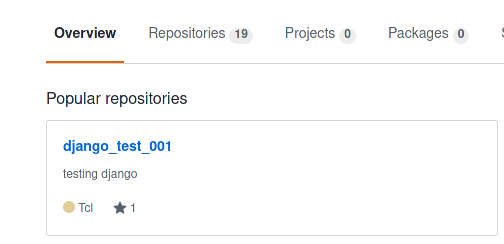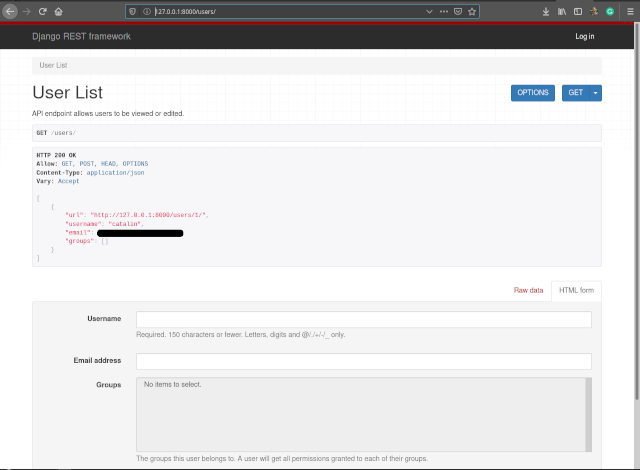Today I will present some aspects of this topic and then I will come back with other information.
1. First, check your security vulnerabilities by the following command:
[mythcat@desk django]$ source env/bin/activate
(env) [mythcat@desk django]$ cd mysite
(env) [mythcat@desk mysite]$ python3 manage.py check --deploy
...
File "/home/mythcat/projects/django/mysite/mysite/settings.py", line 14
<<<<<<< HEAD
Let's run it again:
(env) [mythcat@desk mysite]$ python3 manage.py check --deploy
System check identified some issues:
WARNINGS:
?: (security.W004) You have not set a value for the SECURE_HSTS_SECONDS setting. If your entire site is served only over SSL, you may want to consider setting a value and enabling HTTP Strict Transport Security. Be sure to read the documentation first; enabling HSTS carelessly can cause serious, irreversible problems.
?: (security.W008) Your SECURE_SSL_REDIRECT setting is not set to True. Unless your site should be available over both SSL and non-SSL connections, you may want to either set this setting True or configure a load balancer or reverse-proxy server to redirect all connections to HTTPS.
?: (security.W012) SESSION_COOKIE_SECURE is not set to True. Using a secure-only session cookie makes it more difficult for network traffic sniffers to hijack user sessions.
?: (security.W016) You have 'django.middleware.csrf.CsrfViewMiddleware' in your MIDDLEWARE, but you have not set CSRF_COOKIE_SECURE to True. Using a secure-only CSRF cookie makes it more difficult for network traffic sniffers to steal the CSRF token.
?: (security.W018) You should not have DEBUG set to True in deployment.
?: (security.W020) ALLOWED_HOSTS must not be empty in deployment.
?: (security.W022) You have not set the SECURE_REFERRER_POLICY setting. Without this, your site will not send a Referrer-Policy header. You should consider enabling this header to protect user privacy.
System check identified 7 issues (0 silenced).2. Use the Observatory by Mozilla site to scan the security status of your Django website.
3. Django has built-in security against most forms of CSRF threats, but The CSRF protection cannot protect against man-in-the-middle attacks.
Use HTTPS with HTTP Strict Transport Security by add these lines in your settings.py file.
CSRF_COOKIE_SECURE = True #to avoid transmitting the CSRF cookie over HTTP accidentally.
SESSION_COOKIE_SECURE = True #to avoid transmitting the session cookie over HTTP accidentally.In your settings.py use this:
django.middleware.security.SecurityMiddleware
...
SECURE_BROWSER_XSS_FILTER = True
SECURE_CONTENT_TYPE_NOSNIFF = True6. Use SSL Redirect on your settings.py file.
SECURE_SSL_REDIRECT = True# Content Security Policy
CSP_DEFAULT_SRC = ("'none'", )
CSP_STYLE_SRC = ("'self'", )
CSP_SCRIPT_SRC = ("'self'", )
CSP_IMG_SRC = ("'self'", )
CSP_FONT_SRC = ("'self'", )
# Google Tag Manager or Google Analytics should be allowed in your CSP policy.
CSP_DEFAULT_SRC = ("'none'", )
CSP_STYLE_SRC = ("'self'", "fonts.googleapis.com", "'sha256-/3kWSXHts8LrwfemLzY9W0tOv5I4eLIhrf0pT8cU0WI='")
CSP_SCRIPT_SRC = ("'self'", "ajax.googleapis.com", "www.googletagmanager.com", "www.google-analytics.com")
CSP_IMG_SRC = ("'self'", "data:", "www.googletagmanager.com", "www.google-analytics.com")
CSP_FONT_SRC = ("'self'", "fonts.gstatic.com")
CSP_CONNECT_SRC = ("'self'", )
CSP_OBJECT_SRC = ("'none'", )
CSP_BASE_URI = ("'none'", )
CSP_FRAME_ANCESTORS = ("'none'", )
CSP_FORM_ACTION = ("'self'", )
CSP_INCLUDE_NONCE_IN = ('script-src',)SECURE_HSTS_SECONDS = 86400 # 1 day
SECURE_HSTS_INCLUDE_SUBDOMAINS = True
SECURE_HSTS_PRELOAD = TrueThis tutorial solves most of the security issues of any website built with Django and not just related to this framework.


